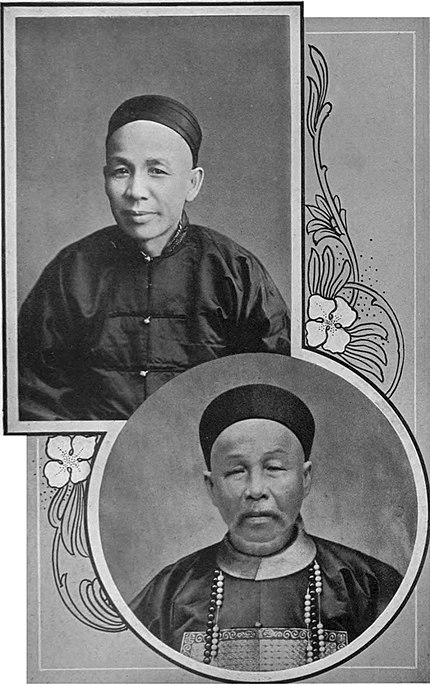Queen's College. After completing his course as a Government student at the Tientsin Chinese Government College, he was appointed surgeon to the Imperial Chinese Navy. Subsequently, while still in the Government service, he became assistant professor of his old college. For some years he was associated with Dr. Kerr, of Canton, but upon arrival in Hongkong he joined the staff of the Alice Memorial and Nethersole Hospitals, commencing private practice in the Colony about eight years ago. Dr. Wan Tün Mo does a great deal of writing in his spare time. He is connected with the literary staff of a Chinese magazine published in Hongkong, is the author of several works in Chinese, and has translated various text-books now in use among Chinese students.

DR. KWAN SUM YIN has the distinction of being the Chinese medical practitioner of longest standing in the Colony. He received his English education at the Diocesan School, and was the first graduate of the Hongkong College of Medicine. In 1893 he was appointed house surgeon to the Nethersole Hospital, but resigned this post, after three years, to enter the service of the Chinese Government at Nanking as an army surgeon. He served the Imperial Government for four years, and then, ten years ago, when European methods were little known among the Chinese, returned to Hongkong and commenced private practice. His surgery is at No. 18a, Stanley Street.

DR. HO KO TSUN, who now has a large private practice in the Colony, has held quite a number of public appointments. Born in 1878, he was educated at Queen's College, and received his professional training at the Hongkong College of Medicine, being awarded a Belilios Scholarship. He was the acting house surgeon at the Tung Wah Hospital from 1901 to 1902; the first laboratory assistant to the Government Bacteriologist, 1902–3, and the resident surgeon at the Nethersole and Ho Min Ling Hospitals from 1903 to 1906. For some time he was the Medical Officer in charge of the Chinese Public Dispensary, Eastern District, and it was this position which he resigned in order to commence private practice. Dr. Ho Ko Tsun is a Licentiate in Medicine and Surgery of the Hongkong College of Medicine, and is tutor in osteology and surgery to the college. His publications include, "A Treatise on First Aid to the Wounded," and "Simple Remedies in various Emergencies" (both in Chinese), and a work on Malaria. He is president of the Tai Yuk Hok Hau, and a lecturer on Hygiene to the same institution (Physical Training).

DR. HO NAI HOP, alias Ho Lokkum, who has one of the most extensive practices in the Colony, received the whole of his medical training in Hongkong. He studied English at Queen's College, and in 1894 entered the Hongkong College of Medicine. After becoming a Licentiate of Medicine and Surgery in 1898 he received the Government appointment of medical officer in charge of the New Territory. Here he had a large and varied experience, for at that time he was the only doctor resident in the district. His headquarters were at the Government Offices at Taipo, and he attended members of all nationalities, visiting out-stations and villages as his services were required. He resigned in 1903 in order to commence private practice, and very soon established a high reputation for himself in the island. Among the appointments which he holds is that of surgeon to the Hongkong Milling Company, Ltd.

DR. COXION TO.— With the spread of the knowledge of European methods of surgery and of medicine there has come into existence in China, during the last ten or fifteen years, a new class of professional men—properly qualified native medical practitioners. Amongst the Chinese there have, of course, been "doctors" for many hundreds of years, but these were not necessarily men who had made the treatment of human ills a scientific study, but rather those who had had handed down to them more or less valuable prescriptions. With the establishment of the Hongkong College of Medicine for Chinese the new state of affairs was inaugurated, and there is now a corps of thoroughly qualified Chinese medical men with extensive private

